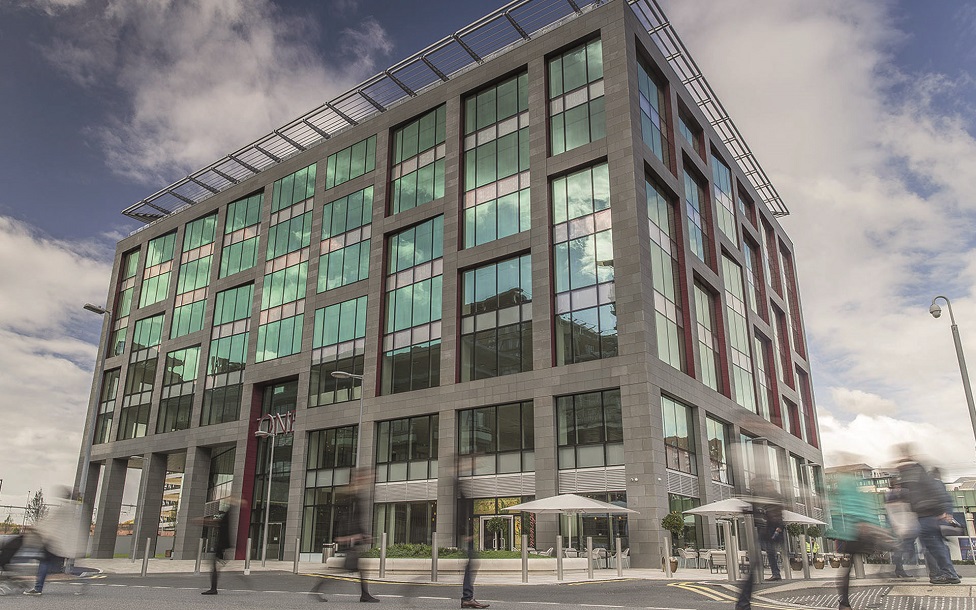How technology is forcing Manchester's traditional occupiers to change their real estate needs
A sizeable part of Manchester’s occupational market sits below the waterline of the tech iceberg. More traditional but no less influential occupier groups – such as lawyers, accountants, retail banks, insurers – are themselves being radically disrupted by the application of technology. They are forced to turn to tech talent to transform their business and retain competitiveness.
7 minutes to read
They are pitched into a fierce battle for that tech talent. Most notably, it is forcing these traditional occupiers to heed lessons from the tech sector in their use of real estate as a mechanism to attract and retain that talent.
Knight Frank recently identified those trends shaping the mid-term futures of these traditional industry sectors as part of its ongoing occupier research programme.
Drawing upon that work, this article explores how technology is challenging the operations and real estate requirements of two specific sectors – legal services and retail banking.
The Legal Services Sector
The strength of response to the disruptive forces of technology will distinguish the future winners and losers in the legal services sector. Rapid advances in technology will see process driven work, historically undertaken by associates for higher margins, being automated and commoditised.
Agile, tech-savvy and client focused new entrants will take increasing market share in this space, hitting the profitability of traditional law firms if they fail to adapt.
One such example is ConvergeTS who provide cloud services specifically for law firms and have recently been named as one of the 50 fastest growing companies in Greater Manchester.
Incumbents can get ahead of the curve, but only if they move fast, invest in and fully embrace technology. Far from being a threat to activity, we believe the advent and adoption of new wave technology such as automation and AI will generate, rather than remove, headcount within law firms.
In our view these technologies drive business productivity and efficiency rather than a dramatic reduction of staffing levels (and hence office space needs).

Above: Freshfields in Manchester
These new technologies will drive a near-term scenario where humans work alongside machines in perfect harmony. In this situation, current processes within law firms are re-engineered and potentially relocated but people are not removed from the process altogether.
In fact there is strong evidence that the adoption of these technologies is creating opportunities for upskilling within law firms. Freshfields Bruckhaus Deringer, who already have a legal services innovation team amongst its near 800 people based in Manchester, have recently teamed up with the University of Manchester’s Law School and AI firm Neota Logic to offer a course on legal technology.
It has also previously collaborated with the University of Manchester to increase awareness of digital technology among future lawyers and innovators.
The disruption being experienced in the legal services sector will also continue to generate a raft of new market entrants or challenger organisations. We believe that this innovative activity is less spatially fixed to central London and has the potential to take root in cities such as Manchester.
As witnessed with the growth of fin-tech and challenger banks, the regional markets are attractive on the basis of cost, talent and lower barriers of entry for innovative start-ups.
Finally, the Big Four accountancy practices – all of whom are committed to growing the strength and scale of their legal services businesses – are significant occupiers within the UK cities and may seek to develop their legal capabilities within or alongside existing regional operations. So over a five year horizon, we remain confident that a legal services sector – transformed by technology – will have a deep presence within the Manchester market.
The Retail Banking Sector
The UK Retail Banking sector is under siege. The economic environment continues to bring uncertainty; regulatory requirements are evolving; customers are demanding greater personalisation combined with excellent customer service; and at the same time technological innovation is challenging traditional business and delivery models while ushering in a set of challenging competitors.
To remain relevant and robust in this new operating environment, retail banks must continue to innovate in both products and processes; implement a marked cultural change; drive an unstinting focus on cost and efficiency gains; and develop an operational model that nurtures innovation, responds to regulatory impacts, is technologically advanced and highlycustomer centric. No small undertaking!
Accordingly, retail banks must rethink their real estate. Branch networks will obviously need to be further rationalised, despite the sensitivities that such moves bring. They will also be significantly redesigned – with both Nationwide and Lloyds Bank showcasing new branch concepts in Manchester in recent months.
Back office functions must be positioned as being more pivotal to a successful banking operation than they have perhaps been to date. Manchester is home to the IT teams of larger banks such as Lloyds, Barclays and the Co-operative Bank.
Given the importance of data management to create personalised banking products these IT functions will become more central to the success of the banks than ever before – making the very term ‘back-office’ redundant in the process.
Head office functions meanwhile will need to be reviewed in terms of cost, regulatory compliance and may be subject to relocation. Barclays for example are actively seeking to consolidate staff into a sizeable Northern campus to create cost and operational efficiencies.
Significantly, as the fortunes of retail banks become more dependent upon innovation and technological delivery, they will need to access and accommodate tech and creative talent, and this will force change in both location and working environment.
Classifying the tech sector by company
Retail banks are embarking on a renewed drive to innovate. There is a particular focus on banks looking outside their walls, collaborating and sharing data with a broader range of partners. What is more, banks are recognising that real estate has a key role to play in nurturing an innovative culture.
We are increasingly seeing retail banks take cutting-edge space in cool, tech dominated markets or sub-markets around the world.
Some retail banks believe that the best way to protect market share is to have maximum influence and scale. They have established large centres of excellence for innovation that are the epicentre of future value creation.
These buildings will house internal teams and external partners, facilitating co-creation. In addition, they will be open to the public, firmly anchored in urban locations, featuring customer-centric space such as experience centres and social areas.

Customers are demanding greater personalisation combined with excellent customer service
Sourcing and securing the best tech and creative talent will be essential and therefore a core part of location, design and fit-out decisions.
Other retail banks may feel it better to separate innovation, preferring instead to fragment in order to capitalise on niche markets and accelerate ideas.
In this model, innovation is nurtured outside of the existing real estate portfolio, and is housed within smaller scale alternative workplaces such as accelerators, incubators and co-working spaces. Location will be determined by where the talent, expertise and partners are, with a greater reliance on fluid project teams.
Despite clear concerns in respect of data security, some banks will seek to offer space within their own buildings that can be accessed by technology startups and skills as a means of stimulating and internalising innovation. This approach may support the re-use of vacant space within the existing portfolio of retail banks.
Whatever approach the banks adopt, the new, cool and exciting world of retail banking deserves a cool and exciting real estate product. Innovation will not be supercharged in dull, open plan office space. Successful ideas will be created and nurtured in inspirational, agile space where people and stakeholders are drawn together.
What does this mean for Manchester?
The transformation of traditional occupier groups on the basis of digital transformation is a huge opportunity for Manchester. Specifically, the opportunity is to position the city away from a backoffice processing function and towards a business critical technology heavy function drawing upon tech talent residing in the city and its surrounds.
As retail banks and law firms seize their opportunity to restructure, they will further gravitate towards high-quality, centrally located and flexible office spaces. Amid disruption from tech they will further adopt those occupational strategies displayed by tech companies over recent years.